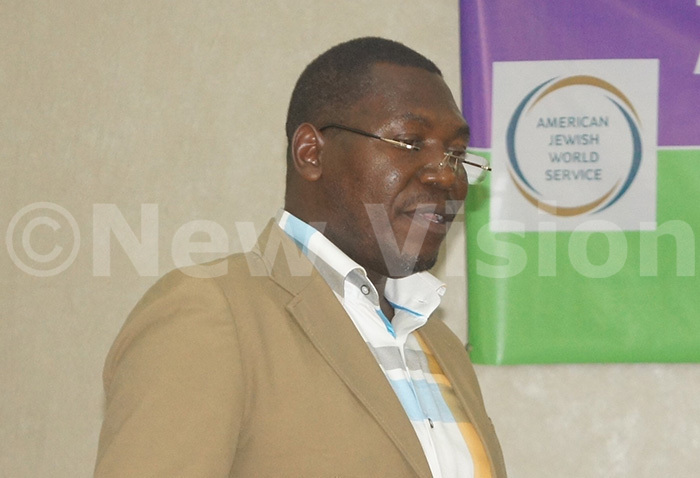Planting trees won't stop climate change effects- CSOs
'The dominant capitalist way of producing and distributing goods plus services to make profits for a few, at the expense of the environment, must be eradicated'
PIC: Caroline Adoch (left) and Becky from the American Jewish World Services, discussing climate justice. (Credit: Julius Luwemba Julius Luwemba)
CLIMATE CHANGE
Civil Society Organisations (CSOs) advocating for environmental justice, remarked that afforestation will not curb the negative effects of climate change if deforestation plus unregulated industrialisation are not stopped.
According to Mrs. Mela Chiponda, a Zimbabwean national, also an activist, most of the currently planted trees are for business purposes hence cannot be relied on, for climate change.
"And there are types of trees which are totally dangerous to the environment whereby, once planted on a certain piece of land, no other plants, neither grass, can grow on that same piece of land," noted Mrs. Chiponda.
This was revealed on Wednesday at the climax of a three-day convention of over 10 CSOs and Community Based Organisations (CBOs) at Sanctum hotel in Entebbe, on matters concerning climate, environment, safety and security of activists among others.
The convention was organised by American Jewish World Service (AJWS) organisation in liaison with National Association of Professional Environmentalists (NAPE).
It observed that climate change occurs when carbon and other emissions caused by economic activity, enter the air and warm the earth causing rising sea levels, melting snow, fires, droughts, extreme storms, rainfall and floods.
"A study commissioned by 20 governments whose countries are most threatened by climate change, reported 400,000 deaths in one year due to climate change; 90% of these deaths were in developing countries, mostly Africa," further noted Mrs. Chiponda who was the facilitator of the convening.
"We need a radical and revolutionary change in how we see and relate to nature and ultimately the planet. The dominant capitalist way of producing and distributing goods plus services to make profits for a few, at the expense of the environment, must be eradicated," concluded the activist.
Threats towards Activists:
Most of the CBO and CSO activists revealed of how they face constant threats from whom they termed as patriarchs working for a system (capitalism), which profiteer from over exploitation of the environment and massive pollution.
"For example, most of the trees cut in northern part of Uganda, are first collected at a certain point near a Police station before being loaded on trucks and transported to Kampala," said William Leslie Amanzuru, an activist, under Friends of Zoka (FoZ) organisation based in northern Uganda.
He said people engaged in environmental degradation are usually seen with guns, though not sure which security agency they belong to.
Yona Wanjala, a lawyer, as well as a climate and environmental advocate under Defenders' Protection Initiative (DPI), said most activists in different parts of the country are intimidated by people whose exploitation work they (activists) criticise, while others are imprisoned and "some are just bought off."
Wanjala revealed that before the end of this year, they (activists) will have drafted a Bill to be enacted into a law that will help to protect the kind of work they do.
"This idea is supported by most of the Members of Parliament who have even pledged to table it in Parliament as a private Member's Bill," intimated Wanjala.
According to Sostine Namanya, the gender and food security officer in NAPE, in 2017, following a process of research, consultation and reflection, AJWS developed a new three-year strategy (2018-2020) that focuses on advancing rural communities' capacity. It was intended to pursue climate justice defined as ecologically sustainable forms of development and natural resource pursed by marginalized rural communities as an essential pathway to mitigating the trajectory and impacts of climate change.
In addition, the strategy also seeks to promote climate justice work that addresses the challenges of large scale land-acquisition of community controlled land.

PIC: Wanjala from Defenders' Protection Initiative spaeaking at the convention
Climate change in Uganda:
A report produced last year by the Office of the Prime Minister in collaboration with the Ministry of Gender, Labour and Social Development, National Planning Authority, Kampala Capital City Authority, Uganda Bureau of Statistics and United Nations Children's Fund (UNICEF), identified climate change and urbanisation as major challenges that will have an increasingly significant impact on the well-being of children in Uganda, especially the poorest, over the coming decades.
"Uganda's vision to become a middle-income country by 2040 remains highly contingent on our ability to protect children's rights in the face of mounting challenges such as climate-related hazards and urbanisation," said Christine Guwatudde Kintu, Permanent Secretary, Office of the Prime Minister.
The study further stated that with temperatures predicted to rise by an unprecedented 1.5ºC in the next 20 years and up to 4.3ºC by the 2080s, Uganda's rapidly changing climate is likely to have an impact on the majority of the population who live in rural areas and are dependent on rain-fed agriculture, as well as on the economy as a whole.